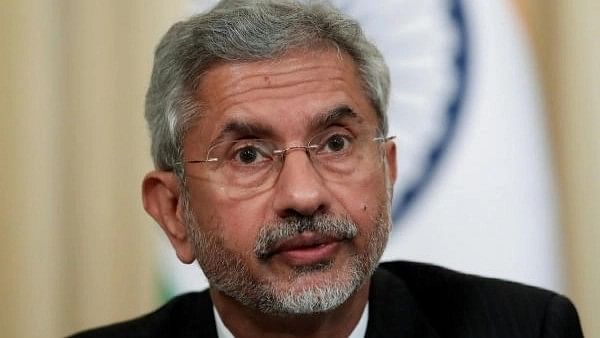
External Affairs Minister S Jaishankar.
Credit: Reuters Photo
It is very hard for India to have normal relations with China, External Affairs Minister S Jaishankar said in New York, noting that the neighbouring communist country violated bilateral agreements and amassed a large number of troops along the Line of Actual Control (LAC) in eastern Ladakh in 2020.
“It is very hard to try to be normal with a country, which has broken agreements, and which has done what it has done. So, if you look at the last three years, it's a very abnormal state,” Jaishankar said during a conversation with former ambassador of the United States to India, Kenneth L Juster, at the Council of Foreign Relations in New York. He was replying to a question on the relations between the two countries.
His comment came after Beijing’s acting envoy to New Delhi, Ma Jia, said that India and China should follow the “important consensus reached by the two leaders and translate it into concerted actions taken by all departments and in all fields” in order to bring bilateral relations “back on the track of sound and steady development at an early date”.
New Delhi has been citing the 1993 and 1996 agreements ever since Beijing made an attempt to change the status quo along the India-China LAC in eastern Ladakh by deploying a large number of troops of the Chinese People’s Liberation Army (PLA) close to it in April-May 2020. The Indian Army too had to deploy additional troops to resist the Chinese PLA’s move to push the LAC westward. This resulted in a military stand-off, which reached a flashpoint with a violent clash at the Galwan Valley on June 15, 2020.
The 1993 and 1996 agreements required both sides to refrain from amassing large numbers of troops in the border areas, to strictly abide by and respect the LAC and to avoid taking any unilateral action to alter it. India has been alleging that China violated the two agreements, leading to a stand-off that has not been completely resolved yet.
“Contacts have been disrupted; visits are not taking place. We have of course this high level of military tension. It has also impacted the perception of China in India,” Jaishankar said, referring to the effect of the military stand-off between the two neighbours. He said that the relations between India and China had been in an “abnormal state” since the Galwan Valley clash. “So, I think there's both an immediate issue, as well as a medium-term issue, possibly longer than medium-term issue out there.”
When India was in the middle of the Covid-19 lockdown in 2020, it was noticed that large numbers of Chinese PLA troops were moving towards the LAC, said Jaishankar.
“So, in the middle of all of that, we actually had to mobilise and counter-deploy, which we did. And, then we had a situation where we were understandably worried that the troops were now much too close. And we cautioned the Chinese that such a situation could create problems and sure enough, in the middle of June 2020 it did,” he added, referring to the Galwan Valley clash.
Though protracted negotiations led to the mutual withdrawal of troops by both the Indian Army and the Chinese PLA from some of the face-off points along the LAC, like Galwan Valley, the northern and southern banks of Pangong Tso, Gogra Post and Hot Springs, the stand-off could not be resolved completely so far. The PLA troops deployed in Depsang, well inside the territory of India along the LAC with China, are still continuing to block the Indian Army’s access to Patrolling Points 10, 11, 12, 12A and 13. A face-off is also continuing in Demchok.
The military commanders of India and China last month held the 19th round of negotiations to resolve the stand-off. They had ‘positive’ talks but failed to reach an agreement for the disengagement of front-line troops in Depsang and Demchok. Prime Minister Narendra Modi and Chinese President Xi Jinping had brief informal talks on the sideline of the G20 summit in Bali in November 2022 and on the sideline of the BRICS summit in Johannesburg last month. They had agreed in Johannesburg to intensify efforts for mutual withdrawal of troops from the remaining face-off points. Xi, however, skipped the G20 summit that Modi hosted in New Delhi earlier this month.
If two of the biggest countries of the world have that degree of tension between them, it has consequences for everybody else, the external affairs minister said.
